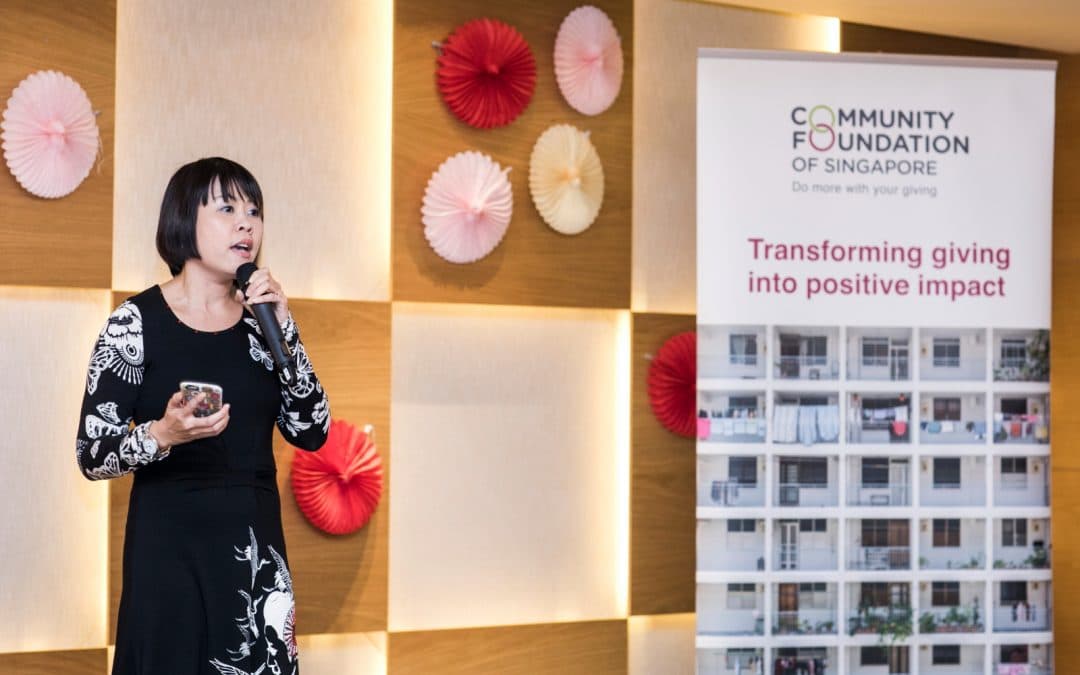Making collaboration a reality


Collaboration for social change has been a hot topic of late. Collaboration’s appeal is apparent in a world beset by complex and evolving social issues — alone we can only do so much, but work together, and look at the change we can achieve.
In the same vein, Colabs, a philanthropic initiative by the Community Foundation of Singapore (CFS) and National Volunteer and Philanthropy Centre (NVPC), drives collaboration by bringing together the public, private and social sectors to tackle complex social issues. In particular, Colabs aims to empower givers to discover the roles they can play alongside existing efforts by government and non-profits.
Colabs currently focuses on three groups: disadvantaged children and youth, persons with disabilities and seniors.
Our first group kicked off by taking a look at the issues facing disadvantaged young people. We were thrilled that a total of 115 individuals and 62 organisations came to share and learn. We discussed existing support for disadvantaged young persons, our present-day challenges, while opening up future opportunities to work together.
If collaboration is to move from a mere aspiration to a reality, we encourage everyone to seriously consider these factors.
Fostering trust
It is often said change moves at the speed of trust. Collaboration requires recognition of each others’ strengths, and a shift away from a competitive mindset. Establishing a clear and common agenda and openly communicating in a safe environment are essential elements in any collaborative effort.
Trust is the key to understanding each other, exchanging ideas and expertise and talking about challenges. On this foundation, we can build a body of knowledge and a culture of transparency for effective collaboration and outcomes we want to achieve.
A shared journey of equals
In the face of complex issues, it’s easy to think the solution lies with someone else. When we enter a collaboration, we need to believe change begins with us. If trust is the glue that keeps collaborative efforts together, then shared ownership and responsibility is the compass that guides our intentions.
To act in the best interests of people affected by social issues, we have to embark on a journey of equals, recognising every party brings unique assets and voices to the table. When the going gets tough — and it will — all parties in the collaboration must be committed to dedicating the resources necessary to deliver change.
Innovation is not new
Change often requires innovation, which isn’t necessarily about inventing something new, but about looking for better ways to do things. Collaboration offers us a diversity of knowledge and expertise to generate new insights and explore improved or more sustainable solutions.
At CFS, we count it a privilege to be able to facilitate the meeting of like-minded people who want to live and give meaningfully. The successes of enabling hope, realising aspirations and rebuilding lives with dignity in our communities are a result of many collaborations and partnerships between our donors and charities.
We are grateful to all our partners for adding to the richness of this journey through your presence, perspective, and perseverance in building a stronger community. The journey has just begun; the best is yet to be.
Joyce Teo
Deputy CEO
Community Foundation of Singapore
Collaboration for social change has been a hot topic of late. Collaboration’s appeal is apparent in a world beset by complex and evolving social issues — alone we can only do so much, but work together, and look at the change we can achieve.
In the same vein, Colabs, a philanthropic initiative by the Community Foundation of Singapore (CFS) and National Volunteer and Philanthropy Centre (NVPC), drives collaboration by bringing together the public, private and social sectors to tackle complex social issues. In particular, Colabs aims to empower givers to discover the roles they can play alongside existing efforts by government and non-profits.
Colabs currently focuses on three groups: disadvantaged children and youth, persons with disabilities and seniors.
Our first group kicked off by taking a look at the issues facing disadvantaged young people. We were thrilled that a total of 115 individuals and 62 organisations came to share and learn. We discussed existing support for disadvantaged young persons, our present-day challenges, while opening up future opportunities to work together.
If collaboration is to move from a mere aspiration to a reality, we encourage everyone to seriously consider these factors.
Fostering trust
It is often said change moves at the speed of trust. Collaboration requires recognition of each others’ strengths, and a shift away from a competitive mindset. Establishing a clear and common agenda and openly communicating in a safe environment are essential elements in any collaborative effort.
Trust is the key to understanding each other, exchanging ideas and expertise and talking about challenges. On this foundation, we can build a body of knowledge and a culture of transparency for effective collaboration and outcomes we want to achieve.
A shared journey of equals
In the face of complex issues, it’s easy to think the solution lies with someone else. When we enter a collaboration, we need to believe change begins with us. If trust is the glue that keeps collaborative efforts together, then shared ownership and responsibility is the compass that guides our intentions.
To act in the best interests of people affected by social issues, we have to embark on a journey of equals, recognising every party brings unique assets and voices to the table. When the going gets tough — and it will — all parties in the collaboration must be committed to dedicating the resources necessary to deliver change.
Innovation is not new
Change often requires innovation, which isn’t necessarily about inventing something new, but about looking for better ways to do things. Collaboration offers us a diversity of knowledge and expertise to generate new insights and explore improved or more sustainable solutions.
At CFS, we count it a privilege to be able to facilitate the meeting of like-minded people who want to live and give meaningfully. The successes of enabling hope, realising aspirations and rebuilding lives with dignity in our communities are a result of many collaborations and partnerships between our donors and charities.
We are grateful to all our partners for adding to the richness of this journey through your presence, perspective, and perseverance in building a stronger community. The journey has just begun; the best is yet to be.
Joyce Teo
Deputy CEO
Community Foundation of Singapore
- Related Topics For You: CHARITY STORIES, CHILDREN, COLABS, COLLECTIVES, INCLUSIVITY & INTEGRATION, OPINION, PERSONS WITH DISABILITIES, SENIORS, STORIES OF IMPACT, YOUTH


